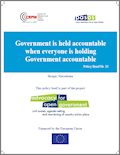
We kindly inform you that, as long as the subject affiliation of our 300.000+ articles is in progress, you might get unsufficient or no results on your third level or second level search. In this case, please broaden your search criteria.

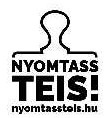
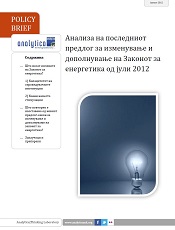
Во Македонија последниве месеци се подготвува ново изменување и дополнување на Законот за енергетика кој беше усвоен во февруари 2011 година. Процесот како таков не е спорен, имено државните институции, секогаш имаат право да предложуваат измени во постоечките норми и регулативи за нивно допрецизирање или подобрување со цел нивна подобра имплементација на терен. Сепак, она што се појавува како континуиран проблем во Република Македонија е хроничниот недостаток на дебата за законски решенија и политики, која дококолку постои најчесто не дава простор за придонес од граѓанското општество, како што во случајов е очигледно со секторот за енергетика. Ова е дел од традицијата во односите помеѓу институциите на државата и останатите сектори во општеството, бидејќи институциите немаат воспоставено јасни канали за соработка со граѓанскиот сектор и неретко гледаат на истиот со недоверба.
More...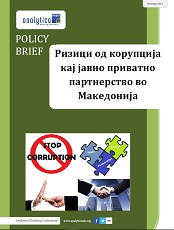
Борбата со корупцијата е горливо прашање за Република Македонија. Европска комисија во последниот извештај за напредок констатира дека корупцијата и понатаму продолжува да постои во многу области и дека корупцијата во јавните набавки е сериозен проблем. Понатаму, корупцијата на локално ново во Република Македонија е недоволно истражена, а и јавната доверба во институциите надлежни за справување со корупција е ниска, па затоа е важно поактивно вклучување на граѓанскиот сектор во мониторирање на трошењето на јавните пари како и континуирано истражување на областа, со цел да се придонесе кон зајакнување на доброто владеење во државата.
More...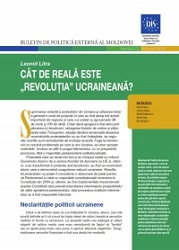
Violent suppression of protests in Ukraine and use of force have triggered a deep crisis involving all important actors in the region and have resulted in 88 deaths and 700 injured. Even if the apex was the flee of Yanukovych, withdrawal of security forces and release of Yulia Tymoshenko, the situation still remains tense because the protestors’ demands were not fulfilled, while Russophile regions are dissatisfied with the recent developments. The escape of Yanukovych does not resolve the problems Ukraine is facing; it simply puts an end to violence. Ukraine teeters on the brink of bankruptcy, with an interim president, without an institutionalized parliamentary majority. Protests that lasted for three months and started once the Government of Azarov refused to sign the Association Agreement with the EU and, subsequently, turned into anti-Yanukovych protests, were a historical event that was proof of the Ukraining nation welding. Protests outcome cannot be deemed a palace coup, since the Parliament voted by constitutional majority the return to 2004 Constitution and, subsequently, the mechanisms of this Constitution were implemented, which provide for the appointment of parliament speaker as interim president, although the procedure was not duly complied with.
More...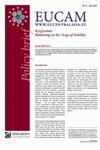
Most former Soviet republics began to consider police reform in the 2000s, over a decade after the Soviet Union’s collapse. By then, the police in the successor states had become one of the most corrupt government agencies, with reputations for serving the needs of political elites and criminal leaders rather than the public. Kyrgyzstan and Tajikistan were the first Central Asian countries to attempt to reform their police. Leaders from both governments invited the Organisation for Security and Cooperation in Europe (OSCE), the United States and the European Union to assist them in their efforts. In both countries, the reform process has been slow and has consistently failed to meet the expectations of donor organisations and of members of civil society. Meanwhile, law enforcement agencies have become even more corrupt and aggressive toward the population.
More...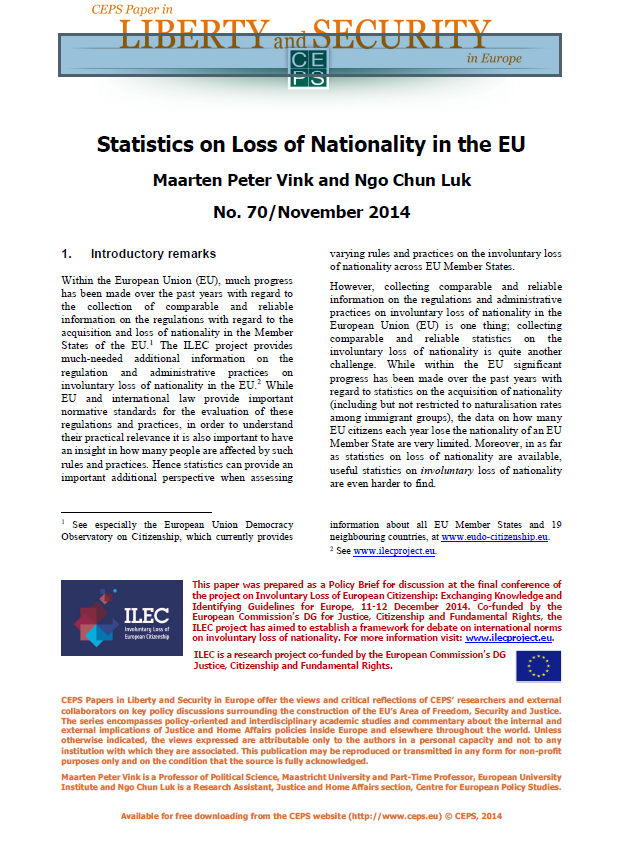
Within the European Union (EU), much progress has been made over the past years with regard to the collection of comparable and reliable information on the regulations with regard to the acquisition and loss of nationality in the Member States of the EU. The ILEC project provides much-needed additional information on the regulation and administrative practices on involuntary loss of nationality in the EU. While EU and international law provide important normative standards for the evaluation of these regulations and practices, in order to understand their practical relevance it is also important to have an insight in how many people are affected by such rules and practices.
More...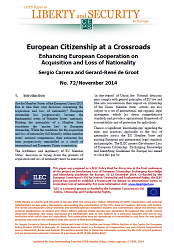
Are the Member States of the European Union (EU) free to take their own decisions concerning the acquisition and loss of nationality? European citizenship has progressively become the fundamental status of Member States’ nationals.Holding the nationality of a Member State constitutes the ‘master key’ to European citizenship. While the conditions for the acquisition and loss of nationality fall formally within member states’ national competences, their autonomy has been progressively remodelled as a result of international and European Union cooperation.
More...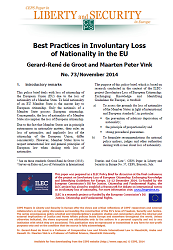
This policy brief deals with loss of citizenship ofthe European Union (EU) due to the loss of nationality of a Member State. To hold nationality of an EU Member State is the master key to European citizenship. Only the nationals of a Member State possess European citizenship. Consequently, the loss of nationality of a Member State also implies the loss of European citizenship.
More...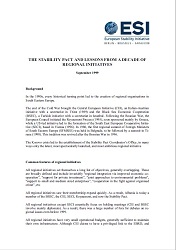
In the summer of 2002, the United Kingdom’s Department for International Development (DFID) approached the European Stability Initiative to conduct a Governance Assessment of Bosnia and Herzegovina. The Governance Assessment was designed to study the evolution of government in Bosnia, and to “assess more fully the constraints on positive decision-making” across all levels of government in Bosnia. Its goal was to promote an open debate within Bosnian society on what constitutes good governance, in order to build up democratic pressures in favour of change.During the second half of 2002, using a team of Bosnian researchers, ESI carried out investigations across Bosnia and Herzegovina on the social and economic challenges facing the country, and how Bosnian governments are responding to them. The empirical research was concluded in October 2003, and the conclusions presented to a range of different audiences during 2003 and the first half of 2004, in Bosnia and Herzegovina and outside. This paper now presents this analytical work to a wider audience. Additional background material on the governance assessment is also available on the ESI website (www.esiweb.org). The views expressed in this report are those of ESI, and do not express the opinion of either DFID or the government of the United Kingdom.
More...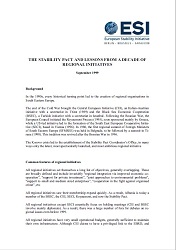
2007 was a dramatic year for Turkish politics and society, even by the standards of a country used to political drama. However, few people would have expected 2008 to be even more volatile, and potentially catastrophic, for Turkish democracy. || The fact that the Turkish Constitutional Court agreed unanimously on 31 March this year to hear an appeal by the Chief Prosecutor to close down the governing Justice and Development Party (AKP) and to ban 70 of its members from political life is a serious blow to the credibility of Turkish democracy. || The Chief Prosecutor accused the AKP of being “the focal point of anti-secular activities.” The triggering event was the government’s rather cautious moves to end the headscarf ban in Turkey’s universities. The charges are, however, incoherent and obviously political. Opinion polls reveal overwhelming public support for allowing women with headscarves to attend university in Turkey. There is no other country in Europe where this is a problem at the level of higher education.
More...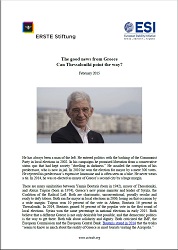
He has always been a man of the left. He entered politics with the backing of the Communist Party in local elections in 2002. In his campaigns he promised liberation from a conservative status quo that had kept society “dwelling in darkness.” He assailed the corruption of his predecessor, who is now in jail. In 2010 he won the election for mayor by a mere 300 votes. He rejected his predecessor’s expensive limousine and is often seen on a bike. He never wears a tie. In 2014, he was re-elected as mayor of Greece’s second city by a huge margin. || … || And yet in one important respect, Boutaris remains in a category of his own: he is a reformer whom both Greek voters and outside observers have embraced as credible. European media tell the tale of a hero slaying fiscal monsters. Der Spiegel called him a “reform hero.” The New York Times wrote that Boutaris “showed Athens how it is done.” In 2014, The Economist praised his city’s “exemplary” transformation. In short, Boutaris came to be the good news story from Greece. How did this happen? And does the story of Thessaloniki suggest a way out of Greece’s current imbroglio?
More...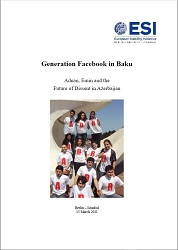
Observing the events in Egypt, Tunisia, and the Middle East as a whole suggests that the hold on power of the Azerbaijani elite might also not be as firm as they like to believe. Beneath the glossy exterior that they have created lives a generation that has learned to expect more from its leaders than handouts at the expense of rights and stability at the expense of democracy. It is a generation that has not given up on the promise of Azerbaijan turning, one day in the near future, into a genuine European democracy. In their endeavours they deserve support, particularly from organisations such as the Council of Europe, whose whole raison d'etre is to preserve democratic standards among its members. In the end it would also be in the interest of Azerbaijan's rulers to respect the rules to which they have themselves committed their country.
More...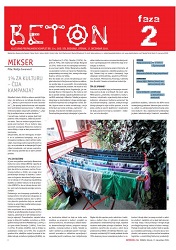
MIKSER, Matija Jovanović: 1% za kulturu – čija kampanja?; ŠTRAFTA Aleksandra Sekulić: Koga propuštamo?; ARMATURA, Jelena Veljić: Nekima (skoro) sve, nekima (skoro) ništa; ZID, Ivana Smiljanić: „Uređivanje (u domaćinstvu i umetnosti)
More...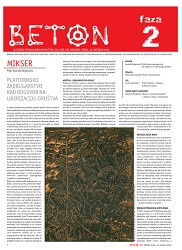
MIKSER, Aranđel Bojanović: Platformsko zadrugarstvo kao odgovor na uberizaciju društva; ŠTRAFTA, Aleksandra Sekulić: Plamen Toma Gotovca; ZID, Zoran Naskovski: Protiv Fašizma / Timeless Political Cartoons; VREME SMRTI I RAZONODE, Vladimir Milojković: Ubistvo u Subotičkoj peščari / Judita na stolu / losing game
More...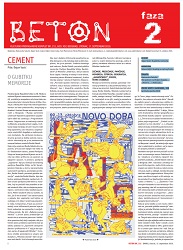
CEMENT, Dejan Vasić: O gubitku memorije; ARMATURA, Jelena Veljić: Izveštaj sa rečnog fronta; ŠTRAFTA, Aleksandra Sekulić: Bilo jednom na Divljem Zapadu... u Americi... u Holivudu...; VREME SMRTI I RAZONODE / ZID, Genitalna panika 2019
More...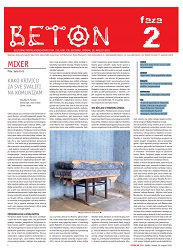
MIXER, Saša Ćirić: Kako krivicu za sve svaliti na komunizam; CEMENT, Dejan Vasić: Tišina je politička odluka; ŠTRAFTA, Savo Romčević, Grupa za konceptualnu politiku: Lingvorasizam; ARMATURA, Jelena Veljić: Sačuvajmo naš parkić!; ZID, Mirjana Dragosavljević: Segmenti izložbe „Tišina je ovde gluvoća“, Bojan Mrđenović: Dobrodošli, Davor Konjikušić: Aura F37, Minipogon / Foto Nenad Porobić
More...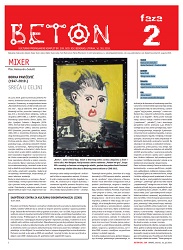
MIXER, Aleksandra Sekulić: Borka Pavićević – Sreća u celini; CEMENT, Saša Ćirić: Nikog nema doma; ŠTRAFTA, Milica Rakić: Legat Konstantina Koče Popovića; ZID, Milica Rakić: Ja nisam oslobodila Beograd
More...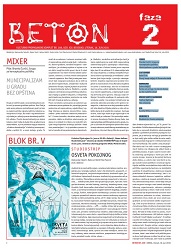
MIXER, Branka Ćurčić, Grupa za konceptualnu politiku: Municipalizam u gradu bez opština; anti CEMENT, Saša Ćirić: I konji konje ubijaju ili Dunavska uteha; ARMATURA, Jelena Veljić: To što oni pričaju i to što mi živimo su dve različite stvari; VREME SMRTI I RAZONODE, Radivoj Šajtinac: Bez ustezanja; ZID, Aurélie William Levaux; BLOK BR. V, Studiostrip: Osveta pokojnog
More...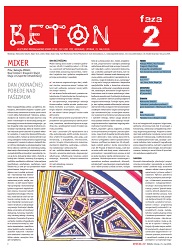
MIXER, Nebojša Milikić, Noa Treister i Dragomir Olujić Oluja iz Grupe Ne-rehabilitaciji: Dan (konačne) pobede nad fašizmom; CEMENT, Saša Ćirić: Lari, Vera, Koča, Kapa i ja; ARMATURA, Jelena Veljić: 67 je previše!; ŠTRAFTA, Aleksandra Sekulić: Podvodne i podvođene prošlosti, i govor budućnosti – Oberhauzen 2019.; ZID, Zoran Naskovski: Mandala i krst / Zbogom oružje
More...